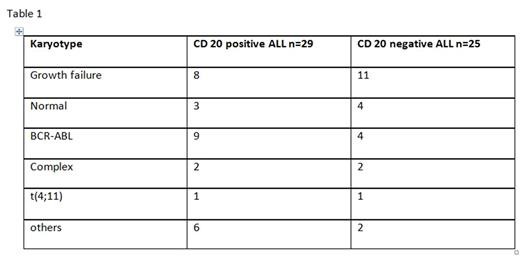Abstract
Acute Lymphoblastic Leukaemia (ALL) is an aggressive malignant lympho-proliferative neoplasm. Although excellent results are seen in paediatric population the same does not hold true in the adult population. In this retrospective study we looked at the patient characteristics of B cell ALL at Tawam hospital which is a tertiary care referral hospital for cancer therapy in the United Arab Emirates
Methods: Tawam hospital tumour registry was used to identify patients diagnosed with ALL aged 15 years and above between January 2010 till June 2017. Medical records were reviewed to collect data about age, sex, presenting hemogram, immuno-phenotyping, karyotype and outcome.
Results: Seventy patients were identified with diagnosis of ALL in the defined period. Sixteen (23 %) patients had diagnosis of T cell ALL. Fifty four (77%) patients had B cell ALL. The median age was 26 years (range 15-71 years). Male to female ratio was 2.85:1. T cell ALL patients were excluded from further analysis.
Immuno-phenotypically 29 patients (54 %) were CD 20 positive ALL (> 20 % CD 20 expression) while the other 25 (46%) were CD 20 negative ALL. The median white blood count (WBC) at presentation was 7000 (range 1 to 495 thousand) per millilitre for CD 20 positive ALL while the median WBC was 12000 (range 1-240 thousand) per millilitre for CD 20 negative cohort.
Cytogenetic and/or molecular diagnostics showed the presence of Philadelphia chromosome or BCR-ABL positivity in nine patients with CD 20 positive ALL (31 %) while only 4 patients (13%) with CD 20 negative ALL were positive for BCR-ABL. (Table 1)
Five patients refused therapy and were lost to follow up after diagnosis. Five patients died of therapy related complications in complete remission (CR) while one patient developed secondary malignancy (Acute myeloid leukaemia and expired). Fifteen patients are in CR1 and in continuous follow up while another twelve patients have been lost to follow up while in CR1. Sixteen patients had either primary refractory or relapsed disease. Ten (62 %) of those had CD 20 positivity while the rest six (38%) were CD 20 negative.
Conclusion: In our experience more than half (54 %) of B cell ALL had a CD 20 positive immuno phenotype. Patients with CD 20 positive ALL had a lower median WBC at presentation as compared to the CD 20 negative cohort. Of greater interest is the higher rate of Philadelphia chromosome positivity in CD 20 positive observed in CD 20 positive cohort as compared to CD 20 negative cohort (31% versus 13 %). Patients with CD 20 appear to have a higher rate of relapsed refractory disease (62% versus 38%).
CD 20 expression in ALL has been reported as ranging from 30 to 60 %. Similarly there has been controversy of CD 20 positive disease being associated with poor patient outcome. The majority of the previous reports either exclude Philadelphia chromosome positive disease or report no significant difference.
Even though CD 20 antibodies have been used previously with variable results, the large disparity in the treatment protocols for ALL for adults makes it difficult to choose a standard approach. Similarly the role of humanized CD 20 anti-bodies like Obinutuzumab and ofatumumab remains undefined.
Although our cohort has a big disparity in Philadelphia chromosome positivity between the two sub groups the small sample size makes it difficult to make a definite conclusion and these results should be validated in a larger cohort.
Alam: BMS: Honoraria; Biologix: Honoraria.
Author notes
Asterisk with author names denotes non-ASH members.


